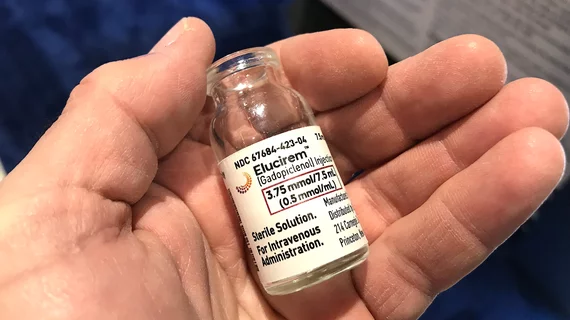New contrast agent earns positive safety classification from ACR
The American College of Radiology has labeled the recently FDA-approved contrast agent VUEWAY and ELUCIREM (gadopiclenol) as a group 2 agent relative to its risk of triggering nephrogenic systemic fibrosis (NSF) in patients following its administration.
The ACR Committee on Drugs and Contrast Media stated that exposure to the gadolinium-based contrast agent (GBCA) represents a “sufficiently low or possibly nonexistent” risk of NSF. The college also noted that the contrast agent has kinetic stability and a long dissociation half-life similar to that of other macrocyclic agents in the group 2 classification.
In September of 2022, the new GBCA was approved by the U.S. FDA for use in adults and children age 2 years and older during MRI exams. Compared to other GBCAs in the U.S., gadopiclenol injection has shown superior relaxivity.
The product is independently commercialized by both Bracco Diagnostics (as VUEWAY) and Guerbet (as Elucirem), as both companies were involved in its development.
Alberto Spinazzi, MD, chief medical and regulatory officer at Bracco, commented on the ACR’s classification in a prepared statement.
"We are encouraged by the steady stream of medical institutions who have added VUEWAY injection to their formulary in view of the high stability and high relaxivity of this agent, and the benefit it provides to patients,” Spinazzi said. “We look forward to its continued adoption across the U.S. and globally, as we work towards regulatory approvals in other countries."
Following its regulatory approval in the U.S., the agent, which uses only half the dose of gadolinium contained in most GBCAs, made its official debut with patients at Wellstar Health System in Georgia back in February. Its clinical uptake has since increased across the U.S.
For more information, visit VUEWAY.com or Elucirem.com.

